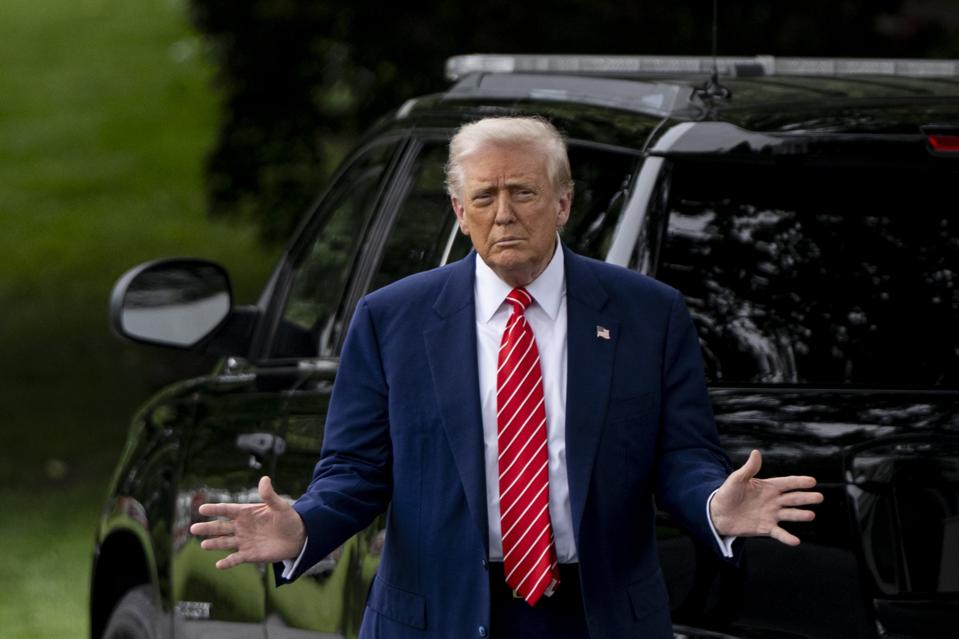President Donald Trump has long used nicknames to denigrate his political foes. The nicknames haven’t ever been the cleverest, but that’s never been the purpose; instead, they’re meant to be memorable and unflattering, shaping the narrative around the individuals’ perceived weaknesses.
At the same time, nicknames haven’t largely stuck with Trump. At least until now, as TACO could have staying power. There are already signs that Trump isn’t the least bit happy as it continues to trend on social media with memes showing him as a chicken or eating tacos.
From Old Granny To TACO
Insulting nicknames have existed since the earliest days of the republic, with Vice President John Adams reportedly calling President George Washington “Mutton Head” when they disagreed. Other now-infamous nicknames include “Old Granny” as Rutherford B. Hayes was sometimes called, while Grover Cleveland was known as “Uncle Jumbo,” a nickname not dissimilar to Bill Clinton being labeled “Bubba.”
It has long been impossible not to think of “Tricky Dick” Nixon or “President Malaise” Jimmy Carter, although the latter’s death may put that one to rest for good.
Social media may help create a lasting nickname that is more on the money than those that were coined by political foes, or from the editorial column of any paper of record. However, because the media cycle turns on a dime, TACO could fade away just as quickly as it emerged on the scene.
“Already, the president has run through First Felon, Cadet Bone Spurs, Don the Con, and Impotus, and those are just the printable ones,” explained Susan Campbell, distinguished lecturer in the College of Arts & Sciences at the University of New Haven.
“I do not think, unlike in the past, any one nickname will stick throughout an entire presidential administration, social media has given us all new and faster ways to spread our name-calling, so while TACO might be the name of the day, it will most likely be replaced by something else,” added Campbell.
“Seems like President Trump has always been successful in handing out nicknames while no one has been able to return the favor,” said Amy E. Bonebright, assistant professor of journalism in the Digital Media and Journalism Department at Liberty University.
“TACO, coming from Wall Street on the heels of tariff policy more turbulent than the Bering Sea, might stick when whispered in backrooms or used in personal texts, but that’s probably about it,” Bonebright continued. “The president has a 100% buy-in when he bestows a nickname, but his opponents seem to lack the desire to publicly challenge him, likely worried about earning their own label.”
Why TACO Could Stick
TACO could stick around, and that’s because it is both a nickname and a slogan. “Trump Always Chickens Out” was coined by Financial Times columnist Robert Armstrong, who described how some investors have anticipated rebounds in the stock market from Trump’s on-again, off-again tariff policies.
As a slogan, it may have the staying power of “Let’s Go Brandon,” which gained traction after a September 2001 NASCAR race in which NBC Sports reporter Kelli Stavast incorrectly described a profane chant in the background as being in support of race winner Brandon Brown. It became the go-to slogan for critics of President Biden.
TACO also has more than a single meaning, and that could help make it an even more powerful rallying cry for Trump’s critics. It has also been used to mean “Treason Against Constitutional Order,” highlighting how it has rapidly evolved from a meme into a cultural signal.
“The rise of TACO is not just political snark, it is a cultural shorthand for public accountability,” said Angli Gianchandani, global brand strategist and adjunct instructor of marketing and public relations at New York University.
“In today’s media landscape, attention is the new currency, and acronyms like this become emotional shortcuts. Just like ‘Let’s Go Brandon’ before it, TACO reflects how narrative control has shifted from political campaigns to the comment section,” added Gianchandani. “It is not a campaign slogan – it is a cultural signal, and in the algorithm age, that signal spreads faster than any press release. The real story here is not just the nickname, it is the erosion of message control and the rise of crowd-sourced branding.”
Trump Doesn’t Like It
What is also notable is that Trump was visibly frustrated when asked about it by CNBC correspondent Megan Cassella. As CNN reported, officials have acknowledged that Trump thought he was called a chicken, while it also raised questions about how he uses tariffs as a bargaining tool.
Trump reacted by saying it was a “nasty question,” which could seem ironic given the nicknames the president has employed or his bluntness on hating Taylor Swift and posting a meme of him shooting a golf ball at Bruce Springsteen.
“It is a real-time case study in how crowd-sourced branding now outpaces traditional messaging, and how meme culture functions as a form of modern accountability,” said Gianchandani.
“If I were on the Trump comms team,” said Campbell, “I’d have quit months ago because this president doesn’t lend himself to having a sense of humor about these nicknames.”

